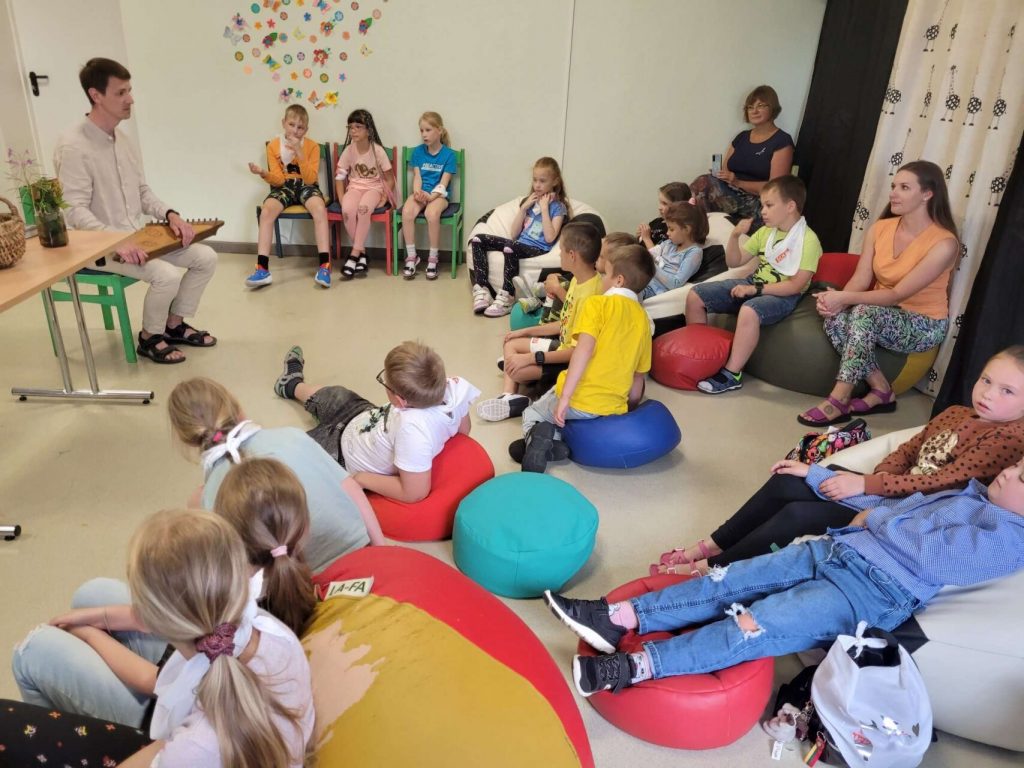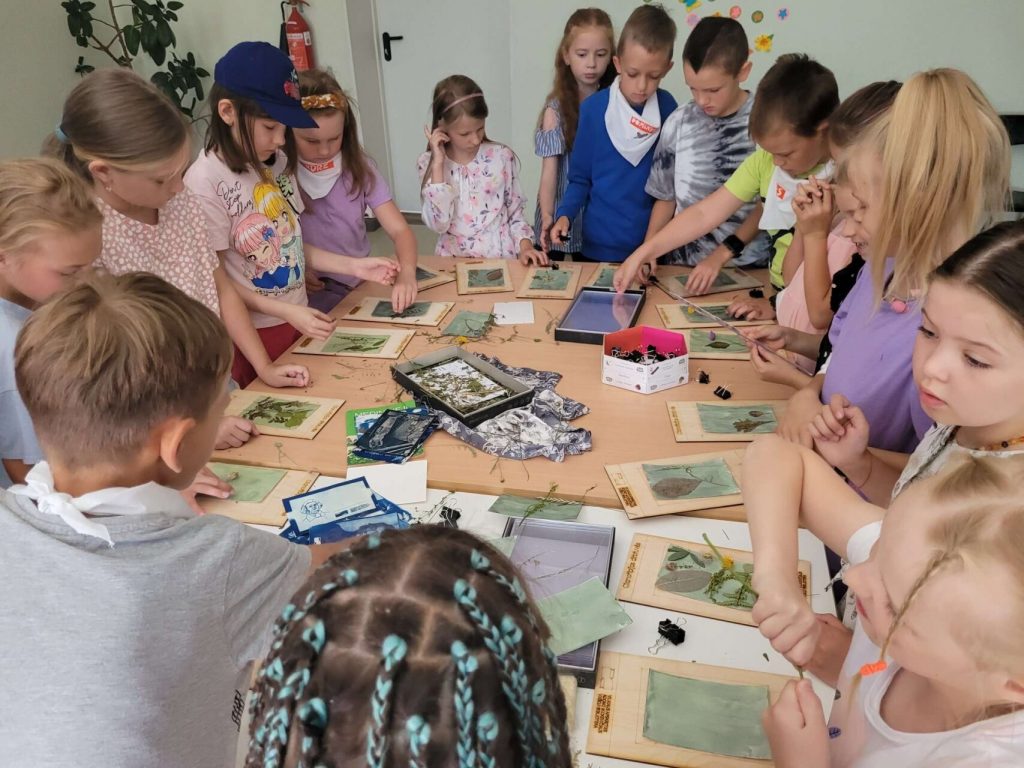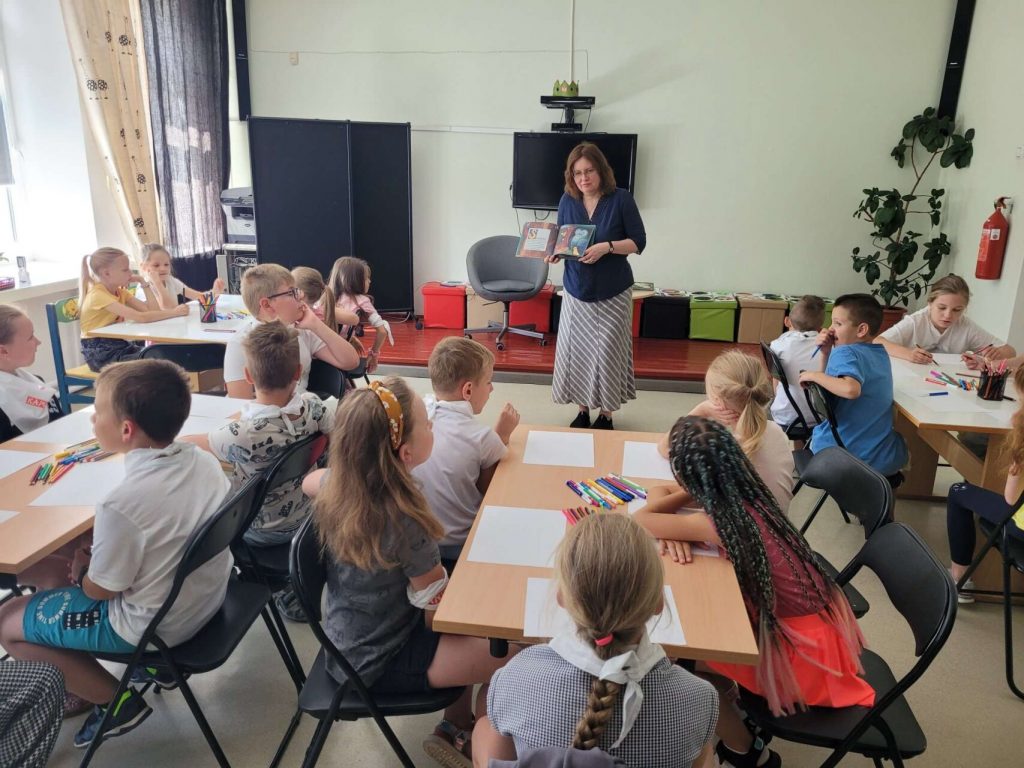On 10-14 July, the Children’s Literature Department of Trakai Public Library organised a children’s day camp “Be Interested, Unique and Creative 2023” with the aim to organise targeted, focused and quality employment for children during the summer holidays. This year was no exception to the popularity of the children’s summer employment project. In less than an hour, the number of available places melted away.
The first day of the camp started with introductions, discussing the rules of the camp and pledging to abide by them (each person wrote his or her own name as a sign of real commitment to abide by the common agreement on a daily basis), and ice-breaker games. The children also received name scarves, which they could decorate with thermoplastic scissors and use the library’s thermocouple device. Later, we all had a practical session – outdoor education “The Wonderful World of Herbs” with Dr. Marius Lasinskas, a famous herbalist in Lithuania, who started his acquaintance with the audience with the sonorous music of a can-can, introduced the 3 basic rules of herbalism, and explored the similarities/differences between plants and people with the children … The campers learnt a lot about the benefits of plants and reinforced their knowledge with herbal salt, which they made and tasted together. The education moved into nature, with a walk along the lakeside right next to the library, learning about the useful plants that are close at hand.

The afternoon of the second day of the camp started with a meeting with Kristina Jakaite-Bulbukiene, the author of the book “Bobausis bez aus ausų: trumpis istorijos o Spurgis” (The Bobausis without Ears: Short Stories about Spurgis), who animatedly told the children about how the book was born, introduced her book’s hero, Spurgis, and told a couple of stories about Spurgis’s life, which led to discussions with the little ones about household chores, the structure of the family, and the experiences of being first, second, third <…> child in the family. The discussion was made meaningful by the creation of a family genealogy tree for each individual family, which the children could continue at home with the family. After the education, together with the Public Health Office of Trakai District Municipality, we went to the stadium to exercise and play active games, and to see how our pulse rate changes before and after active participation. Back at the library, another educational activity was waiting for us – painting on silk, using special paints and outlines – pouring paint on fabric to create beautiful pictures: kittens, fish, boats, flowers…

On the third day of the camp, a meeting with Jolanta Sereikaite, a writer and artist, took place, and she presented how she created her book “Katytės Tikės miškas”. Tikė is a cat that roams the forest and introduces children to the inhabitants of the forest: animals, birds and bugs. Following the cat’s example, the little ones told us what animals they keep at home or would like to keep. During this meeting, the campers drew animals that meet new friends in different places – a snake, a fish, a squirrel and others. And finally, they created names and stories for the animals they drew, thus taking on the role of the author. The second half of the day was also fun – the campers had the opportunity to make unique, real kaleidoscopes with the help of educator Juste from 100zuikiu.lt – the kind you can’t buy, because personal input is always closer to the heart and more cherished. Before the creative process, the educator analysed the optical illusions with the children and explained how a kaleidoscope is created.

On the fourth day of the camp, we started with a programme on the prevention of alcohol, tobacco and other psychoactive substances consumption, prepared by the representatives of the Public Health Bureau of Trakai Municipality, which included a lot of educational information, an instructive film and a quiz on healthy lifestyle and the harm caused by harmful habits. Later, the fun part of the day was waiting for everyone: the children were entertained by the illusionist Yuri from the celebration centre “Mažasis genijus”, who surprised them with various magic tricks together with his assistant Ghost. The walls of the library were filled with exclamations of admiration, enthusiasm and joyful moods of the campers! The good emotions also gave us the strength to work with another library asset – a laser cutter to engrave wooden keyrings with children’s drawings.
On the last day of the camp, there was no shortage of excitement either. The “Cyanotype Workshop” with Irina from the Adam Mickiewicz Public Library of Vilnius County was a novelty in our library. Cyanotype is one of the world’s oldest photographic imaging techniques: the children made their own picture out of prepared shapes on paper coated with a light-sensitive solution and watched how, when exposed to the light, a photographic print was created in a distinctive blue colour. As the day progressed, we exchanged the blue for yellow and black and listened to an interesting and sincerely dedicated beekeeper, Virginijus Kondrotas, talk about bees. We learned how to calm them down, how they defend themselves against bears and why honey comes in different colours. The beekeeper treated the children to fresh honey and the library provided fresh cucumbers and dessert cheeses. And to make sure that the farewell to the camp until next year is not a sad one, we put on some music and used all the colours of the rainbow to make faces. At the same time, those waiting were making badges to wear.
That’s how intense the week was! It was great to see the smiles of the little ones, to hear “thank you” from the children and their parents, to read positive feedback in the public space. Parents think that their children had fun, were involved in interesting and enriching activities, and learnt many new things.
The Children’s Literature Unit is pleased that the activities at the camp helped children to develop their creativity and initiative, as well as to increase their resilience to harmful habits. We tried to create a safe and inclusive environment for the young campers, to develop cognitive and creative technological skills. Camp activities also promoted reading and healthy lifestyle habits, and helped develop a culture of communication and cooperation.
